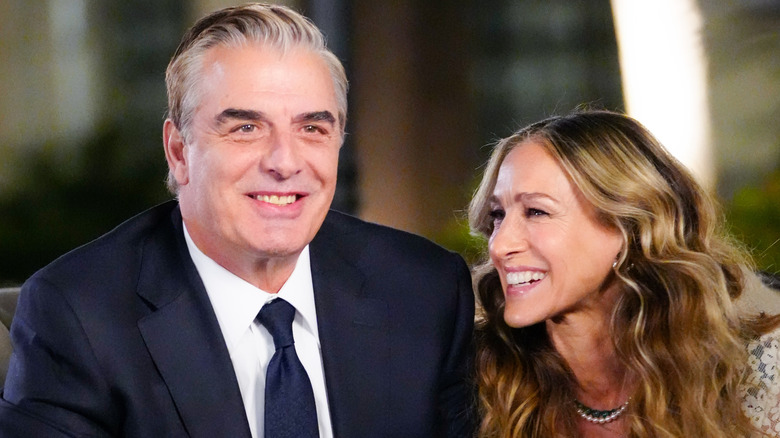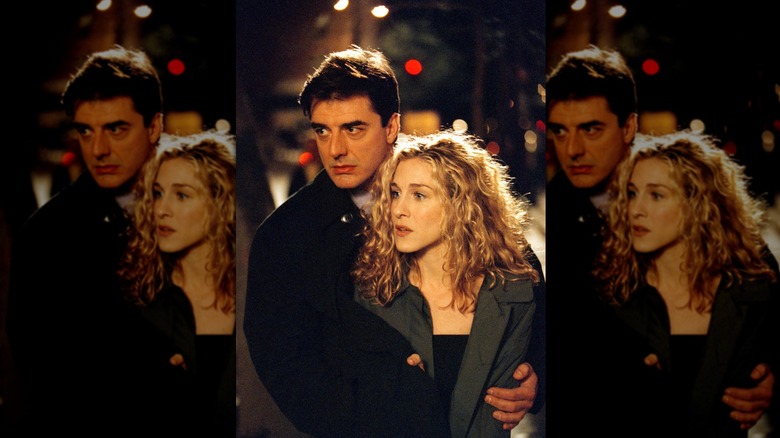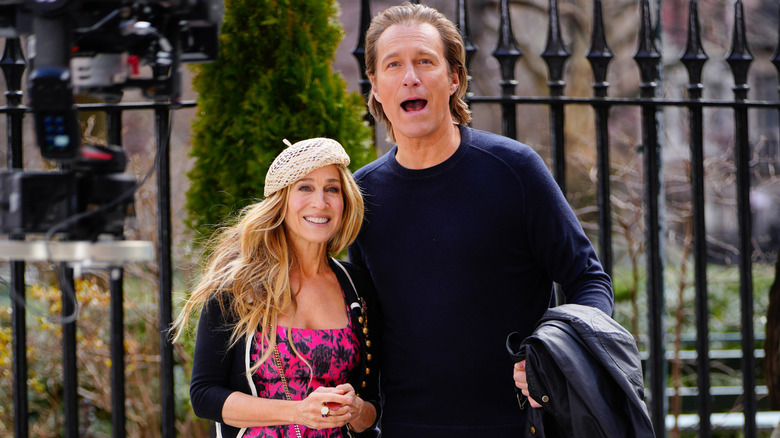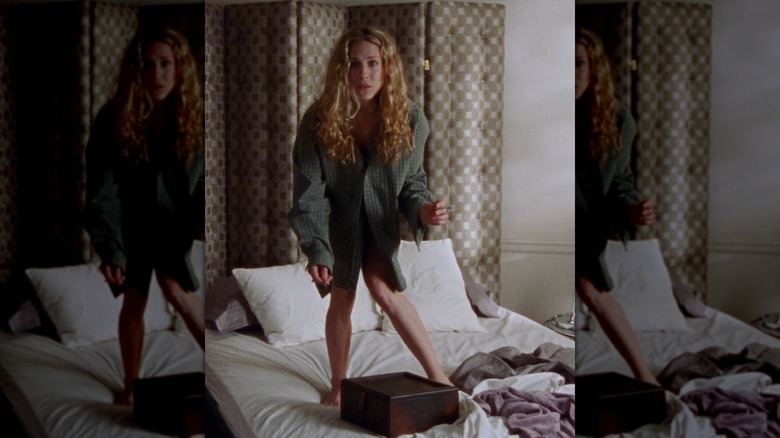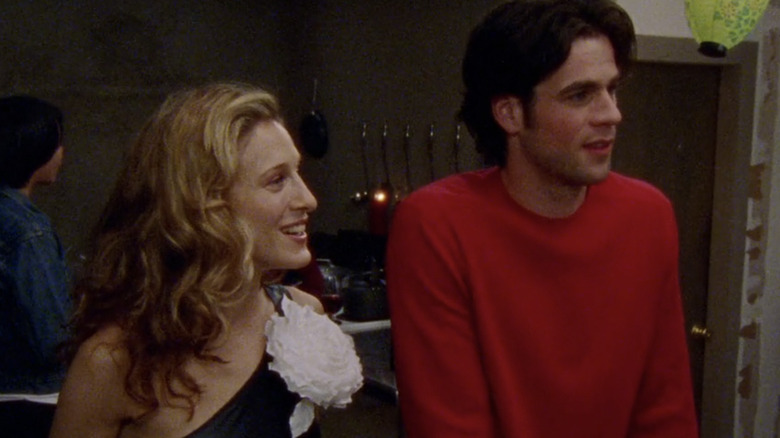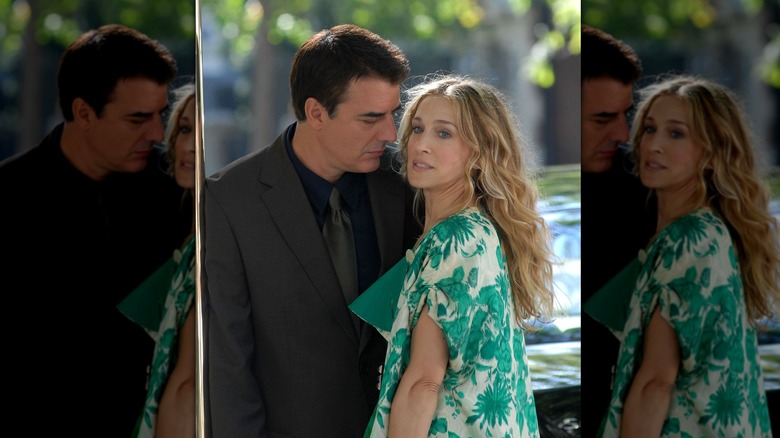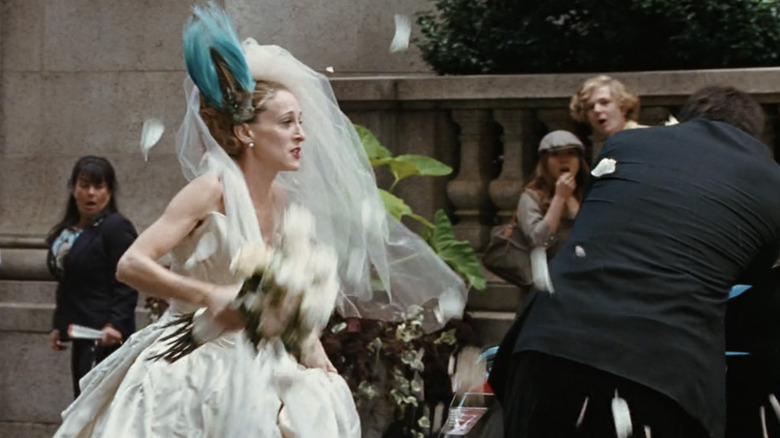Red Flags In Carrie Bradshaw's Relationships We Can Learn From
As much as Carrie Bradshaw and "Sex and the City" are part of our pop culture fabric, we would be remiss not to address the elephant in the room: Carrie had bad taste in men. Not only that, but her behavior in relationships was often questionable. This may be exactly why so many people tuned in and stayed hooked for the six seasons.
Even Sarah Jessica Parker can admit that Carrie wasn't exactly the best partner or made good romantic decisions. "I would simply say that smart people make bad decisions sometimes [and] are foolish in judgement," Parker told HuffPo in June 2025, adding that Carrie did make mistakes and wasn't always as mature as she should have been. After all, a mature woman does not hurl a Big Mac across a room when her partner tells her he's moving to Paris for work.
Now that it's been revealed that "And Just Like That..." will be ending, it's a good time to take a look back — and not just at the Carrie Bradshaw outfits that would still be totally on-trend in 2025 — but at the red flags in Carrie's relationships, too. While Carrie wasn't the only one to find herself in precarious dating situations, she did seem to have more than the other characters. Thanks to Carrie and her mistakes, we definitely learned some valuable lessons that hopefully we won't forget.
Carrie often chose emotionally unavailable men
One of the biggest red flags in Carrie's relationships was how often she found herself with emotionally unavailable men. While emotional unavailability can shift throughout a person's life, for others, it's something that doesn't go away, preventing intimate relationships. "An emotionally unavailable person cannot or will not consistently connect with another person through deep conversation, showing or being receptive to another person showing emotions, and being honest about their feelings, thoughts, actions, and intentions," clinical psychologist Charlynn Ruan, PhD, told Everyday Health.
While Big was the very definition of emotionally unavailable for all six seasons, there were others. There was Patrick Casey, the recovering alcoholic, who wasn't supposed to be dating yet, but Carrie pressured him into it. Then Kurt Harrington from the first season, who just wanted sex and Carrie, thinking she could have "sex like a man," as she called it, tried to do the same. We also have Jeremy (played by David Duchovny) who was a patient in a mental hospital, Sam the 20-something kid who lived in an apartment with no toilet paper, Seth (played by Jon Bon Jovi) who Carrie picked up at her therapist's office and who lost interest in women after having sex with them, and, of course, Berger who probably should have joined Jeremy in the mental hospital due to all his issues and insecurities. There's nothing wrong with sometimes being emotionally unavailable, but ultimately, relationships can't exist if what has caused the unavailability isn't remedied.
Issues with honesty and trust
As any therapist will tell you, honesty is the foundation of any relationship. Without it, your relationship won't have stable footing, making it only a matter of time before it falls apart. Carrie, as well as some of her partners, lied about several things when honesty would've been easier.
While the biggest betrayal Carrie committed was cheating on Aidan with Big (who was married to Natasha at the time), there were other things that Carrie lied about. She tried to keep her smoking a secret when Aidan asked her to quit, she lied about never having an abortion when Aidan asked her outright if she'd had one, then backtracked to admit that she did have one in her 20s. Carrie would also eventually cheat on Big with Aidan in the movie, "Sex and the City 2," because she thought running into him in Abu Dhabi was some sort of sign.
Cheating aside, Carrie wasn't honest about other things, too. After hooking up with Howie Halberstein — a friend of Harry Goldenblatt's — before Harry and Charlotte's wedding, Carrie couldn't just tell the guy that she's not into jack rabbit sex, nor could she come clean to politician Bill Kelley (played by John Slattery) about not wanting to bridge the kink gap in their relationship. Of course, Carrie was lied to as well, like by Berger, who initially failed to mention his relationship status, and Big, who kept the Paris move a secret until the last minute.
Carrie didn't always respect her partners' boundaries and privacy
Carrie always asked too much of those she dated. Lacking basic self-awareness, she not only pushed and sometimes ignored her partners' boundaries altogether, but invaded their privacy, too. When it came to Big, Carrie showed up (uninvited) to the church where he went with his mother every Sunday, scheduled a meeting with his ex-wife under the guise of wanting to write a children's book, and pushed a relationship on him. With Aidan, Carrie tried to bully him into forgiving her for cheating on him when he wasn't ready, then later in the series, she forced Aidan to let Big stay at his country house despite Aidan's animosity for Big. When she and Big finally got engaged, Carrie wrangled him into a huge wedding he didn't want, and found herself jilted on her wedding day.
Regarding other partners, Carrie badgered a recovering alcoholic into dating her, crossing not only his boundaries but those of the AA process. In Season 2, Episode 3, "The Freak Show," Carrie meets Ben and begins to assume he's hiding something, so she ransacks his apartment looking for freak-like clues and is caught trying to pry open a locked box. The contents? His Cub Scout badge collection.
Toward the end of the series, when Carrie started dating Aleksandr Petrovsky, her behavior continued. She didn't give Petrovsky the space he needed to make art and pushed his boundaries. Because of this, the relationship didn't survive.
Despite being a sex writer, Carrie was judgmental of her partners' sexual preferences
While no one can deny the fact that "Sex and the City" was ahead of its time in the way it approached sex and relationships, we couldn't help by wonder why Carrie was so uptight about certain sex-related topics. If one's full-time job is writing about sex, you would think that same person wouldn't be squeamish about the sexual kink community and that they certainly wouldn't need a lesson in busting BS myths about bisexuality. Carrie wasn't exactly open-minded when it came to certain sex acts and, even worse, she couldn't talk about them.
When Carrie was dating the politician Bill Kelley in Season 3, he casually said that he wanted her to pee on him. This is called a golden shower or, if you want to get more technical, urophilia. According to research by Justin J. Lehmiller, via Lifehacker, of the 4,000 U.S. adults Lehmiller surveyed, 32% have sexually fantasized about urine being incorporated into their sex life. In other words, it's not that uncommon. Not only did Carrie publicly shame Kelley in her column for it, but she couldn't even have an adult conversation with him about not wanting to do it.
Two episodes later, Carrie dated Sean, a bisexual man. Again, despite being a supposed sex expert, Carrie couldn't even fathom how bisexuality works. In trying to make sense of it, she was incredibly judgmental, ultimately deciding she was too old to date bisexuals.
There were far too many on-again, off-again patterns
Although many people get caught up in the vicious cycle of the on-again, off-again relationship pattern, it's not healthy behavior. According to a 2018 study published in Family Relations: Interdisciplinary Journal of Applied Family Science, this cycle is psychologically stressful for both people involved, creating a feeling of constant instability even when the two are on-again. Not to mention the toll it takes on friends and family members who have to be privy to the drama.
Throughout the six seasons of "Sex and the City," and into the three seasons of "And Just Like That...," this on-again, off-again relationship dynamic was something that Carrie did with both Big and Aidan — more than once. She also did it with Kurt Harrington, someone who was a hookup from her past that she lured into her life again, her f*** buddy John McFadden, and, of course, Berger. In fact, if "And Just Like That..." wasn't coming to an end after season three, we probably would have seen Carrie and Aidan give their relationship yet another try, only to break up again.
It's one thing to be with someone, break up with them, and then during that time apart, working on what you need to accept about the other and tweak about yourself before giving it another chance, but Carrie never did that. Carrie never learned from the relationship lessons in her life. Which is also a big red flag.
Carrie was prone to emotinal outbursts
When you've had enough, when you feel like you've been led on for months or years, or the love of your life fails to show up to your wedding, you're entitled to crash out. Emotions are part of the human condition and are meant to be felt. But in Carrie's case, she seemed to have poor emotional regulation skills, and because of this, instead of removing herself from the situation or trying to breathe through it, she would sometimes go ballistic. For example, infamously throwing a Big Mac across Big's kitchen.
"Emotional outbursts often occur when a pre-existing condition meets a high-stress situation," licensed independent social worker and therapist Billy Roberts told PsychCentral, adding that improved sleep, practicing self-care, and setting boundaries can help reduce triggers around these types of outbursts. "If there are pre-existing concerns lurking such as an anxiety, mood, or attention disorder, it might also be time to get professional support from a mental health provider."
Because "Sex and the City" never really dove into Carrie's past, we don't know if her outbursts were rooted in family trauma or if it was solely her dating history that pushed her to the edge. Either way, Carrie should have continued therapy past Season 2, Episode 13; she could have unpacked a lot, potentially setting herself up for emotional stability and romantic success. But considering she told her therapist that she didn't believe in therapy, it probably would've been a waste of money.
